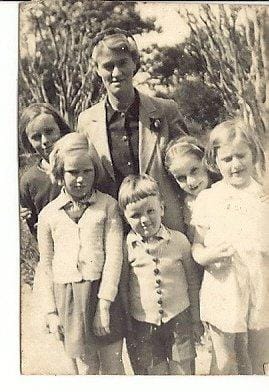Battered by Fate

The Penrose-Marks home, Oblivion, at Kidd’s Beach, just south of East London, in the Cape Province had a wonderful view of the river. Rear: L to R Jennifer Penrose-Marks, Joan Millard, Front: Angela and Tim Hughes, and Penrose-Marks twins Elizabeth and Anne.
Battered by Fate
When Joan’s father died, she received a notice to vacate her home within a fortnight. The prejudiced magistrate grudgingly agreed to a two week extension.
Battered by Fate
Her father had lived in the house at Herschel for almost forty years. Her mother had died there five years before. No boxes or packing cases or even paper were available: everything had gone to the war effort.
She tried to keep things as normal as possible for her deceased sister’s two children, Angela and Tim. She reserved one corner of the dining room for toys, books and flowers. Sarah the maid kept them supplied with tiny loaves of bread. The wireless that had only been switched on for the news before was now a great asset.
Joan discovered a house on a small holding which had stood empty for over twenty years. She asked for storage space there. She hired the only available lorry.
It was the rainy season. On the last day the lorry overturned into a donga (ditch). She was only shaken, the furniture somewhat battered. She was still using a stick due to a fall off a horse months earlier.
Her cousins, Barbara and Pen Penrose-Marks had invited them to their home, Oblivion, at Kidd’s Beach, just south of East London until business affairs were settled and they could go up to Rhodesia and join Gervas on his Greenham farm.
A friend, Jack, undertook driving them to the station. The roads were shocking. They skidded everywhere in the mud. Full of sad thoughts at leaving home and Herschel for the last time, she also worried about the future.
The children were in front with her, the maid in the back. Suddenly the car skidded into the first lamp post at the entrance to the town. She clutched the two children to her. Her head hit the windscreen with a loud bang. It cracked but did not shatter.
They climbed out of the car. The children were screaming. The little maid was in hysterics. Jack said not a word.
She sat down on the roadside and said firmly “Now, stop that fearful row and just think how lucky you are. Here I am, ever so old, and this is my first accident, (except for the one in the lorry today) and you are only six and nearly four and you have already been in one.”
They stopped yelling. Afterwards they boasted. “We are so lucky we’ve been in an accident already. Poor Joanie is so old but she has never had one before!”
Joan was shaken, with a headache, a black eye and purpling face. They went off to the station in a taxi. When searching for their compartment a woman said, “You poor little thing. I’ve got a hubby just like that.”
She thanked her and got into the train giggling. Everyone assumed the children were hers. It was easier to agree than explain.
Excerpt taken from Rain on the Roof, by Joan (nee Millard) Freyburg (1999) ISBN 0 646 38477 5 with family permission. Tim Hughes has electronic copies of this wonderful book that may be available on request via the comments section of this blog.
